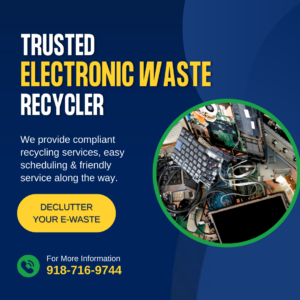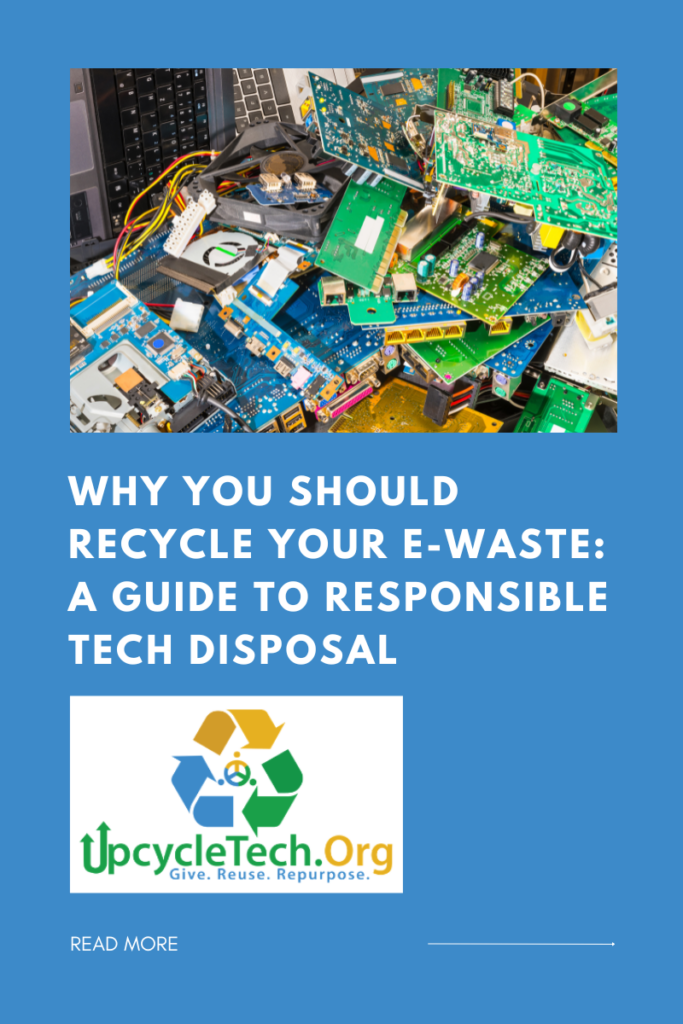In the fast-paced digital world we face today, we are constantly faced with the opportunity to upgrade our gadgets and electronics. From smartphones and laptops to TVs and kitchen appliances, these devices have become an integral part of our lives. But what happens when they reach the end of their lifespan? The answer often lies in a growing problem: e-waste. Here’s why recycling your e-waste is not just a good idea, but a necessary step towards a sustainable future.
1. Environmental Protection
E-waste contains hazardous materials such as lead, mercury, cadmium, and arsenic. When improperly disposed of, these toxic substances can leach into the soil and groundwater, causing severe environmental damage. Recycling e-waste ensures that these harmful components are safely managed, preventing soil and water contamination.
Example: A single computer monitor can contain up to 8 pounds of lead. Proper recycling prevents this from ending up in landfills.

2. Resource Conservation
Electronics are made using valuable resources, including precious metals like gold, silver, and copper. Recycling allows these materials to be recovered and reused, reducing the need for mining and conserving natural resources.
Example: Recycling one million laptops saves the energy equivalent to the electricity used by 3,657 U.S. homes in a year.
3. Energy Savings
The process of recycling e-waste uses significantly less energy compared to producing new products from raw materials. This energy saving translates to a reduction in greenhouse gas emissions, contributing to the fight against climate change.
Example: Producing new aluminum from recycled material uses 95% less energy than producing it from raw bauxite ore.
4. Economic Benefits
Recycling e-waste can stimulate the economy by creating jobs in the recycling and refurbishing industry. Additionally, it provides affordable electronics to those who might not be able to afford new devices through the resale of refurbished items.
Example: The e-waste recycling industry employs thousands of people in various roles, from collection and transportation to processing and reselling refurbished goods.
5. Legal Compliance
Many countries and regions have regulations in place that require the proper disposal and recycling of e-waste. By recycling your electronics, you ensure compliance with these laws, avoiding potential fines and contributing to a culture of responsibility and sustainability.
6. Data Security
Throwing away old electronics without proper disposal can lead to data breaches. Recycling through certified facilities ensures that your data is securely destroyed, protecting your personal and business information.
Example: Certified e-waste recyclers like UpcycleTech, follow strict protocols to wipe or destroy data on devices, ensuring your sensitive information does not fall into the wrong hands.
How to Recycle Your E-Waste Responsibly

- Find an E-Waste Recycler: Look for local recycling centers or e-waste collection events.
- Use Manufacturer Take-Back Programs: Many electronics manufacturers offer take-back programs for their products. Check wi
th the manufacturer for more details. - Donate or Resell: If your device is still functional, consider donating or reselling it. This extends the life of the product and helps someone in need.
- Participate in E-Waste Collection Drives: Community drives are a convenient way to dispose of your e-waste responsibly. Keep an eye out for events in your area.
Join Us in Making a Difference
At UpcycleTech, we are committed to helping you recycle your e-waste responsibly. We offer free e-waste pick-up services for local businesses and ensure that your old electronics are recycled or refurbished in an environmentally friendly manner.
Contact us today to schedule your e-waste pick-up or learn more about our recycling programs. Let’s work together to create a sustainable future.

